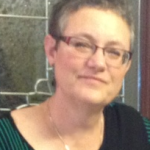My reading
Haftarat Parashat Tazria
2 Kings 4:40– 5:19
4:42 וְאִ֨ישׁ בָּ֜א מִבַּ֣עַל שָׁלִ֗שָׁה וַיָּבֵא֩ לְאִ֨ישׁ הָאֱלֹהִ֜ים לֶ֤חֶם בִּכּוּרִים֙ עֶשְׂרִֽים־לֶ֣חֶם שְׂעֹרִ֔ים וְכַרְמֶ֖ל בְּצִקְלֹנ֑וֹ וַיֹּ֕אמֶר תֵּ֥ן לָעָ֖ם וְיֹאכֵֽלוּ׃
4:43 וַיֹּ֙אמֶר֙ מְשָׁ֣רְת֔וֹ מָ֚ה אֶתֵּ֣ן זֶ֔ה לִפְנֵ֖י מֵ֣אָה אִ֑ישׁ וַיֹּ֗אמֶר תֵּ֤ן לָעָם֙ וְיֹאכֵ֔לוּ כִּ֣י כֹ֥ה אָמַ֛ר יְהוָ֖ה אָכֹ֥ל וְהוֹתֵֽר׃
4:44 וַיִּתֵּ֧ן לִפְנֵיהֶ֛ם וַיֹּאכְל֥וּ וַיּוֹתִ֖רוּ כִּדְבַ֥ר יְהוָֽה׃
5:1 וְ֠נַעֲמָן שַׂר־צְבָ֨א מֶֽלֶךְ־אֲרָ֜ם הָיָ֣ה אִישׁ֩ גָּד֨וֹל לִפְנֵ֤י אֲדֹנָיו֙ וּנְשֻׂ֣א פָנִ֔ים כִּֽי־ב֛וֹ נָֽתַן־יְהוָ֥ה תְּשׁוּעָ֖ה לַאֲרָ֑ם וְהָאִ֗ישׁ הָיָ֛ה גִּבּ֥וֹר חַ֖יִל מְצֹרָֽע׃
5:2 וַאֲרָם֙ יָצְא֣וּ גְדוּדִ֔ים וַיִּשְׁבּ֛וּ מֵאֶ֥רֶץ יִשְׂרָאֵ֖ל נַעֲרָ֣ה קְטַנָּ֑ה וַתְּהִ֕י לִפְנֵ֖י אֵ֥שֶׁת נַעֲמָֽן׃
5:3 וַתֹּ֙אמֶר֙ אֶל־גְּבִרְתָּ֔הּ אַחֲלֵ֣י אֲדֹנִ֔י לִפְנֵ֥י הַנָּבִ֖יא אֲשֶׁ֣ר בְּשֹׁמְר֑וֹן אָ֛ז יֶאֱסֹ֥ף אֹת֖וֹ מִצָּרַעְתּֽוֹ׃
5:4 וַיָּבֹ֕א וַיַּגֵּ֥ד לַאדֹנָ֖יו לֵאמֹ֑ר כָּזֹ֤את וְכָזֹאת֙ דִּבְּרָ֣ה הַֽנַּעֲרָ֔ה אֲשֶׁ֖ר מֵאֶ֥רֶץ יִשְׂרָאֵֽל׃
5:5 וַיֹּ֤אמֶר מֶֽלֶךְ־אֲרָם֙ לֶךְ־בֹּ֔א וְאֶשְׁלְחָ֥ה סֵ֖פֶר אֶל־מֶ֣לֶךְ יִשְׂרָאֵ֑ל וַיֵּלֶךְ֩ וַיִּקַּ֨ח בְּיָד֜וֹ עֶ֣שֶׂר כִּכְּרֵי־כֶ֗סֶף וְשֵׁ֤שֶׁת אֲלָפִים֙ זָהָ֔ב וְעֶ֖שֶׂר חֲלִיפ֥וֹת בְּגָדִֽים׃
5:6 וַיָּבֵ֣א הַסֵּ֔פֶר אֶל־מֶ֥לֶךְ יִשְׂרָאֵ֖ל לֵאמֹ֑ר וְעַתָּ֗ה כְּב֨וֹא הַסֵּ֤פֶר הַזֶּה֙ אֵלֶ֔יךָ הִנֵּ֨ה שָׁלַ֤חְתִּי אֵלֶ֙יךָ֙ אֶת־נַעֲמָ֣ן עַבְדִּ֔י וַאֲסַפְתּ֖וֹ מִצָּרַעְתּֽוֹ׃
5:7 וַיְהִ֡י כִּקְרֹא֩ מֶֽלֶךְ־יִשְׂרָאֵ֨ל אֶת־הַסֵּ֜פֶר וַיִּקְרַ֣ע בְּגָדָ֗יו וַיֹּ֙אמֶר֙ הַאֱלֹהִ֥ים אָ֙נִי֙ לְהָמִ֣ית וּֽלְהַחֲי֔וֹת כִּֽי־זֶה֙ שֹׁלֵ֣חַ אֵלַ֔י לֶאֱסֹ֥ף אִ֖ישׁ מִצָּֽרַעְתּ֑וֹ כִּ֤י אַךְ־דְּעֽוּ־נָא֙ וּרְא֔וּ כִּֽי־מִתְאַנֶּ֥ה ה֖וּא לִֽי׃
5:8 וַיְהִ֞י כִּשְׁמֹ֣עַ׀ אֱלִישָׁ֣ע אִישׁ־הָאֱלֹהִ֗ים כִּֽי־קָרַ֤ע מֶֽלֶךְ־יִשְׂרָאֵל֙ אֶת־בְּגָדָ֔יו וַיִּשְׁלַח֙ אֶל־הַמֶּ֣לֶךְ לֵאמֹ֔ר לָ֥מָּה קָרַ֖עְתָּ בְּגָדֶ֑יךָ יָבֹֽא־נָ֣א אֵלַ֔י וְיֵדַ֕ע כִּ֛י יֵ֥שׁ נָבִ֖יא בְּיִשְׂרָאֵֽל׃
5:9 וַיָּבֹ֥א נַעֲמָ֖ן בסוסו [בְּסוּסָ֣יו] וּבְרִכְבּ֑וֹ וַיַּעֲמֹ֥ד פֶּֽתַח־הַבַּ֖יִת לֶאֱלִישָֽׁע׃
5:10 וַיִּשְׁלַ֥ח אֵלָ֛יו אֱלִישָׁ֖ע מַלְאָ֣ךְ לֵאמֹ֑ר הָל֗וֹךְ וְרָחַצְתָּ֤ שֶֽׁבַע־פְּעָמִים֙ בַּיַּרְדֵּ֔ן וְיָשֹׁ֧ב בְּשָׂרְךָ֛ לְךָ֖ וּטְהָֽר׃
5:11 וַיִּקְצֹ֥ף נַעֲמָ֖ן וַיֵּלַ֑ךְ וַיֹּאמֶר֩ הִנֵּ֨ה אָמַ֜רְתִּי אֵלַ֣י׀ יֵצֵ֣א יָצ֗וֹא וְעָמַד֙ וְקָרָא֙ בְּשֵׁם־יְהוָ֣ה אֱלֹהָ֔יו וְהֵנִ֥יף יָד֛וֹ אֶל־הַמָּק֖וֹם וְאָסַ֥ף הַמְּצֹרָֽע׃
5:12 הֲלֹ֡א טוֹב֩ אבנה [אֲמָנָ֨ה] וּפַרְפַּ֜ר נַהֲר֣וֹת דַּמֶּ֗שֶׂק מִכֹּל֙ מֵימֵ֣י יִשְׂרָאֵ֔ל הֲלֹֽא־אֶרְחַ֥ץ בָּהֶ֖ם וְטָהָ֑רְתִּי וַיִּ֖פֶן וַיֵּ֥לֶךְ בְּחֵמָֽה׃
5:13 וַיִּגְּשׁ֣וּ עֲבָדָיו֮ וַיְדַבְּר֣וּ אֵלָיו֒ וַיֹּאמְר֗וּ אָבִי֙ דָּבָ֣ר גָּד֗וֹל הַנָּבִ֛יא דִּבֶּ֥ר אֵלֶ֖יךָ הֲל֣וֹא תַעֲשֶׂ֑ה וְאַ֛ף כִּֽי־אָמַ֥ר אֵלֶ֖יךָ רְחַ֥ץ וּטְהָֽר׃
5:14 וַיֵּ֗רֶד וַיִּטְבֹּ֤ל בַּיַּרְדֵּן֙ שֶׁ֣בַע פְּעָמִ֔ים כִּדְבַ֖ר אִ֣ישׁ הָאֱלֹהִ֑ים וַיָּ֣שָׁב בְּשָׂר֗וֹ כִּבְשַׂ֛ר נַ֥עַר קָטֹ֖ן וַיִּטְהָֽר׃
5:15 וַיָּשָׁב֩ אֶל־אִ֨ישׁ הָאֱלֹהִ֜ים ה֣וּא וְכָֽל־מַחֲנֵ֗הוּ וַיָּבֹא֮ וַיַּעֲמֹ֣ד לְפָנָיו֒ וַיֹּ֗אמֶר הִנֵּה־נָ֤א יָדַ֙עְתִּי֙ כִּ֣י אֵ֤ין אֱלֹהִים֙ בְּכָל־הָאָ֔רֶץ כִּ֖י אִם־בְּיִשְׂרָאֵ֑ל וְעַתָּ֛ה קַח־נָ֥א בְרָכָ֖ה מֵאֵ֥ת עַבְדֶּֽךָ׃
5:16 וַיֹּ֕אמֶר חַי־יְהוָ֛ה אֲשֶׁר־עָמַ֥דְתִּי לְפָנָ֖יו אִם־אֶקָּ֑ח וַיִּפְצַר־בּ֥וֹ לָקַ֖חַת וַיְמָאֵֽן׃
5:17 וַיֹּאמֶר֮ נַעֲמָן֒ וָלֹ֕א יֻתַּן־נָ֣א לְעַבְדְּךָ֔ מַשָּׂ֥א צֶֽמֶד־פְּרָדִ֖ים אֲדָמָ֑ה כִּ֡י לֽוֹא־יַעֲשֶׂה֩ ע֨וֹד עַבְדְּךָ֜ עֹלָ֤ה וָזֶ֙בַח֙ לֵאלֹהִ֣ים אֲחֵרִ֔ים כִּ֖י אִם־לַיהוָֽה׃
5:18 לַדָּבָ֣ר הַזֶּ֔ה יִסְלַ֥ח יְהוָ֖ה לְעַבְדֶּ֑ךָ בְּב֣וֹא אֲדֹנִ֣י בֵית־רִמּוֹן֩ לְהִשְׁתַּחֲוֹ֨ת שָׁ֜מָּה וְה֣וּא׀ נִשְׁעָ֣ן עַל־יָדִ֗י וְהִֽשְׁתַּחֲוֵ֙יתִי֙ בֵּ֣ית רִמֹּ֔ן בְּהִשְׁתַּחֲוָיָ֙תִי֙ בֵּ֣ית רִמֹּ֔ן יִסְלַח־נא [] יְהוָ֥ה לְעַבְדְּךָ֖ בַּדָּבָ֥ר הַזֶּֽה׃
5:19 וַיֹּ֥אמֶר ל֖וֹ לֵ֣ךְ לְשָׁל֑וֹם וַיֵּ֥לֶךְ מֵאִתּ֖וֹ כִּבְרַת־אָֽרֶץ׃










